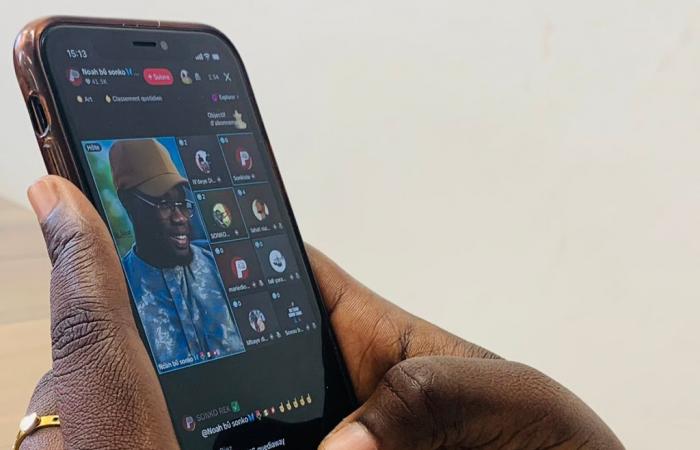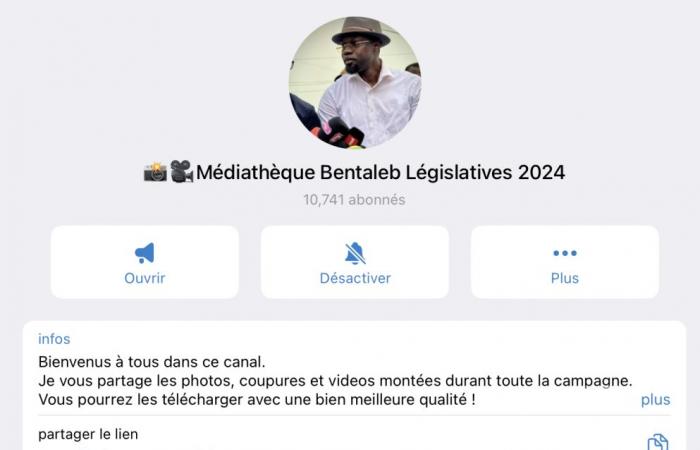As the legislative elections approach in Senegal, the electoral campaign is taking a decisive turn with the rise of digital communication. Candidates, aware of an increasingly connected population, are adopting innovative strategies by relying on social networks to interact directly with voters. Between engaging videos, “livestreams” and interactive content, this dynamic is transforming the political landscape, redefining the methods of mobilizing and informing citizens.
As soon as you walk through the doors of Sam’s workshop in the Medina, the smell of fresh inks and screen printing materials fills the air. The walls of the workshop are decorated with sketches and models of various posters, but an atmosphere of unusual calm reigns there. “It’s surprising,” admits Ousmane Dièye, one of the screen printers. “Usually at this time we would be overwhelmed with orders. But for now, the pace is very leisurely. I only have one order,” explains the young man. The craftsmen are busy around their machines, but without the frenzy of yesteryear. As the elections approached, they expected a large influx of customers wanting to prepare posters and visual aids. However, so far only a few sporadic orders have been placed, mainly for basic T-shirts and posters.
“We have already collaborated with a few parties, but not as much as in previous elections,” says Elhadj Malick Sylla, young graphic designer and head of the workshop. “It seems that some parties are not yet ready or are hesitant to invest so much this time. The situation is very different from what we have experienced before. » The craftsmen adjust their machines, hoping that customers will soon flock. “Perhaps candidates are waiting to see how the campaigns evolve before investing in visual supports,” suggests Ousmane.
At the same time, the political atmosphere seems less energetic than before, which could explain the slowdown in activities at the workshop. A major transformation is taking place in the campaign methods of candidates. Gone are the days of mass posters and brandished T-shirts. Digital communication has established itself, catalyzed by connected youth and constantly evolving technologies.
A digital turning point
In the streets of Dakar, traditional posters are becoming increasingly rare. Candidates favor social networks such as Facebook, Twitter, WhatsApp and TikTok to reach voters and supporters. “Digitalization offers a powerful tool for creating a direct link with citizens,” explains Mouhamed Ciss, digital professional. According to him, digital campaigns make it possible to interact in real time and quickly adapt messages based on feedback from voters. Some candidates focus more on WhatsApp and TikTok, because “content sharing is more viral there”.
The candidates compete in creativity to capture attention on their profiles. Videos, animations, infographics and viral challenges are on the program, and each post is carefully crafted to maximize engagement. “Visual content is crucial,” emphasizes Mouhamed Ciss. “A strong image or an inspiring video can generate more interest than a simple poster. » Engagements on social networks are closely scrutinized, each “like” or share is seen as a victory for the campaign teams. The major advantage of digital, according to him, is the ability to measure the popularity of the candidate in real time: “we have access to instantaneous statistics”. However, he cautions that messages must meet the expectations of the target audience and meet standard standards.
Young voters are at the heart of this strategy. According to a report by NOISY DIGITAL, Senegal had 3.71 million social media users in January 2024, representing 20.6% of the total population. The And Bessal Senegal (ABS) coalition of candidate Abdoulaye Sylla seized this opportunity. Amadou Tidiane Guissé, agent and member of the communications unit, explains: “We chose digital because almost all Senegalese have a smartphone and connect to social networks. We have invested in new equipment and formed a team of communication and digital specialists. » Through their 120 WhatsApp groups, they interact with their activists and supporters, also using TikTok and Facebook to produce videos and infographics: “The world is evolving with digital. Communication on the networks is more viral, and we spent more than 100 million.”
“I feel immense joy watching these videos and following the lives”
The Pastef party does not remain behind in the field of digital communication. Throughout the day, he actively shares his actions on the ground, thus attracting the attention of a large number of Senegalese people. Mariama Ndiaye is an example. Met on VDN, this Pastef supporter is absorbed by her phone. While browsing her news feed, she came across a video of a party meeting in Tambacounda. She takes a moment to watch the video, a smile spreading across her face. “Since I cannot travel to the regions to attend Pastef meetings, I turn to social networks. This allows me to follow the information in real time,” explains the young student. Enthusiastically, she adds: “I feel immense joy watching these videos and following the “lives”. Sometimes emotions overwhelm me and I don’t hesitate to let my tears flow. »
For Djibril Diallo, Master in Political Science, “we are witnessing an overhaul of the Senegalese political space, accompanied by the emergence of new political leaders and a new relationship between elected officials and citizens. Political communication evolves with this change, and in the digital age, it is natural that actors resort to it. » He observes that “digital communication is faster and reaches populations more efficiently than the transport and distribution of posters or T-shirts, especially in remote areas”. However, he warns that, despite this development, activists remain attached to identity markers such as T-shirts and caps bearing the image of their leaders. It is therefore preferable to find a balance between traditional and digital communication. As the legislative campaign progresses, it seems that the digital strategy is becoming the norm in Senegal. By relying on new technologies, candidates seek to meet the expectations of an increasingly connected population.
Mamadou DIOP – Ndieme FAYE







